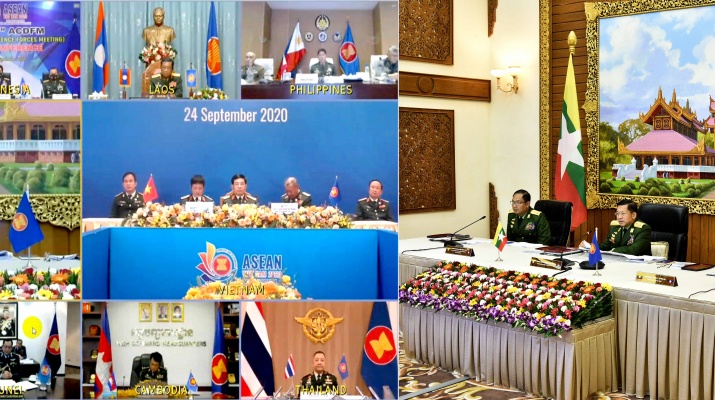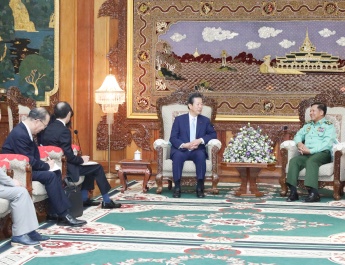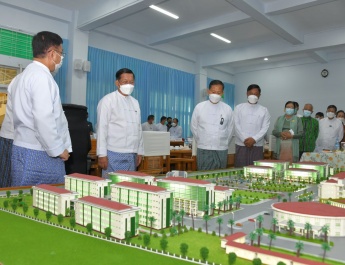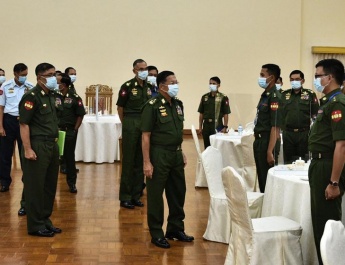Nay Pyi Taw September 24
The 17th ASEAN Chiefs of Defence Forces’ Meeting (17th ACDFM) was held in the form video conference this morning, and Commander-in-Chief of Defence Services Senior General Min Aung Hlaing took part in it from the parlour of the Bayintnaung Villa here.
Present at the meeting together with the Senior General were Lt-Gen Moe Myint Tun and Lt-Gen Ye Win Oo of the Office of the Commander-in-Chief (Army), and the ASEAN chiefs of Defence Forces and members of the delegations of the respective countries. Then, documentary photos of the participants from the various countries were taken through the screenshot. Afterwards, the introductory session followed.
The meeting chairman Chief of the General Staff of the Vietnam People’s Army Senior Lieutenant General Phan Van Giang gave the opening address.The director general of the General Department of Defence Intelligence under the Ministry of National Defence of Vietnam presented the meeting minute of the 17th ASEAN Military Intelligence Meeting (AMIM-17), the director general of the Department of Operations under the General Staff of the Vietnam People’s Army presented the meeting minute of the 10th ASEAN Military Operations Meeting (AMOM-10).
Led by meeting Chairman Senior Lieutenant General Phan Van Giang, the ASEAN chiefs of Defence Forces exchanged views on “Military Cooperation for a Cohesive and Responsive ASEAN” theme of the 17th ACDFM.In his discussion, Senior General Min Aung Hlaing prayed all the participants of the 17th ACDFM to be free from pandemic COVID-19, and with pleasure, he honoured the meeting chairman Senior Lieutenant General Phan Van Giang and officials of the Vietnam People’s Army for the successful holding of the virtual conference on the 17th ACDFM amidst the many difficulties.
Senior General said the discussion will focus on “Military Cooperation for a Cohesive and Responsive ASEAN”. Southeast Asian region is facing unconventional challenges in the security issues such as terrorism, climate change, scarcity of resources, infectious diseases, natural disasters, unusual migration of workers, food shortages, trafficking in persons, drug trafficking, information security, piracy and transnational crimes in addition to conventional challenges, he said.
Regional countries need to rapidly respond to these threats through consolidation. As pressure and threat of terrorism are very dangerous among ASEAN countries, they should exchange information about anti-terrorism. Now-adays, ASEAN countries must enhance relations among them and further cooperate in defence and security measures so as to rapidly respond to challenges related to terrorism. To be able to build consolidation among ASEAN countries, armed forces of ASEAN should make special efforts for carrying out the tasks in their respective sectors. ASEAN armed forces need to take care of harmony in building trust, exchanging information in time, cooperating in capacity building and exchanging good visits.
National security, regional peace and stability and basic structure of development for the whole world depend on security environ of each country. As such, a single country cannot overcome challenges and complications but all member countries can overcome and respond to these challenges through unity for ensuring stability and strengthening of future security environment.
The ASEAN has adopted and is implementing the Two Year Activities Working Plan for cooperation of ASEAN armed forces. Deep implementation of the co-operative activities can contribute much to building of bilateral trust and collective response. In addition to cooperation in ASEAN armed forces, the ASEAN Regional Forum (ARF), the ASEAN Defence Ministers’ Meeting (ADMM) and the ASEAN Defence Ministers’ Plus Meeting (ADMM-Plus) are held to further cooperate in Humanitarian Assistance and Disaster Relief-HADR, military medicine, maritime security, counter terrorism, peacekeeping operation and hu-manitarian mine action arenas for enabling not only ASEAN countries but also partnership countries to have harmonized response capability.
As Southeast Asian region possesses a very wide water territory, regional countries must rapidly respond to challenges in unity through various ways such as maritime domain awareness, capability buil-ding, exchange of information and combine patrol in the seas. They will have to make rapid responses in the regional seas of Southeast Asian region by collectively signing the measures of combine patrol and standard procedures for patrolling.
It is necessary to take care of initiating the consolidation among ASEAN countries. These countries need to carry out deeper cooperation among them. Cooperation, diverse attitudes, disputes and conflicts may cause in bilateral relations among the countries. As such, all need to consider diversity of ASEAN countries in building the consolidation. However, all must harmonize their diversities in accord with the ASEAN’s motto “One Vision, One Identity, One Com-munity”. These countries should build optimistic relations among them for mutual cooperation to make cooperation in overcoming conventional and non-conventional challenges they face daily.
All global countries are trying to improve the social life of their peoples and ensure peace and stability. To this end, ASEAN countries are also working together on natural disaster issues, regional peace, stability and development issues, human resource needs and anti-terrorism acts for the life security and development of the peoples. ASEAN has been able to strengthen unity year by year.
Among ASEAN countries, terrorism, drug smuggling, money laundering, human trafficking, arms smuggling, piracy, economic crimes and cybercrimes are happening in a form of transnational crimes. ASEAN Political-Security Com-munity-APSC aims to build up regional peace in collaboration with dialogue partner countries and contributes to regional peace and security. By trying to address unconventional challenges such as boundary problems, international terrorism, arms smuggling, transnational crimes, drug smuggling, human trafficking, maritime security, natural resource sharing, transnational health problems and environmental issues in a united and prompt manner, the efforts for regional peace and stability will bear fruit.
When it comes to human security, it is necessary to speed up implementing important sectors for social environment like urban settlement, anti-international terrorism, protection of ailing people, combat of illegal arms and narcotic drugs, and environmental protection. United collaboration is necessary for inclusive security ranging from the security for individuals to community security, political security, economic security, environmental security, food security and healthcare. By doing this, the needs for the peoples in the regional countries can be fulfilled and their concerns reduced, paving the way for building a more secure social life. The human security of each country can contribute to the peace, stability and security of the regional countries.
No one knows when the pandemic of COVID-19 will end. As prevention is better than cure, effective educative measures must be taken for the people to have better understanding of the reasons for causing pandemic, infection and preventive ways. This pandemic is a threat to the entire humanity and a non-conventional security challenge. Therefore, every country must not only to employ effective ways to prevent the pandemic but also to forge effective regional cooperation. In addressing such security challenges, military resources must be effectively tapped on humanitarian grounds. Moreover, ASEAN member countries should share their experiences, successes and strong and weak points in taking COVID-19 preventive, control and treatment measures.
In the same way as countries in Southeast Asia have cooperated in unity for the strengthening of the regional economy with the aim of human resources development in the region, the Military Cooperation for a Cohesive and Respon-sive ASEAN can be implemented successfully by the cooperation of armies of ASEAN countries in overcoming conventional and unconventional security challenges faced by the region, and this will contribute to the peace and stability of the ASEAN region. The Senior General urged all to build the one single cohesive and responsive ASEAN community through the unity and friendship of the people in the ASEAN region for stability and security of lives of the people in the region in the future and to enhance the capabilities of cohesion, responsiveness and defending the sovereignty of ASEAN countries by responding to the challenges immediately through the unity of ASEAN armed forces for the stability and lives of people in the region.
Then, the meeting approved the joint declaration on the Military Cooperation for a Cohesive and Responsive ASEAN of the 17th ACDFM and 2-year action plan (2020-2022) of ASEAN armed forces. Afterward, the commander-in-chief of the Vietnam People’s Army made closing remarks.
Then, a ceremony was held to hand over the chairmanship of ACDFM to the delegation of the Royal Brunei Armed Forces, which will host the 18th ACDFM as the alternative chairman. The commander-in-chief of the Vietnam People’s Army delivered a speech and screened a video depicting the tasks carried out by Vietnam People’s Army as the chair. Then, the commander-in-chief of Vietnam People’s Army handed over the flag of ACDFM to the military attaché of Brunei, who later hoisted it atop a flagstaff. Afterward, the commander-in-chief of the Vietnam People’s Army and the military attaché of Brunei posed for a docu-mentary photo and returned to their respective seats.
Afterward, the supreme commander of Royal Brunei Armed Forces who will perform duties of the chairmanship delivered a speech and screened a documentary video of Brunei before the conclusion of the meeting.





